Review: Nashville Opera's 'Gleefully Subversive' THE CRADLE WILL ROCK: Opera, Musical Theater or Both?
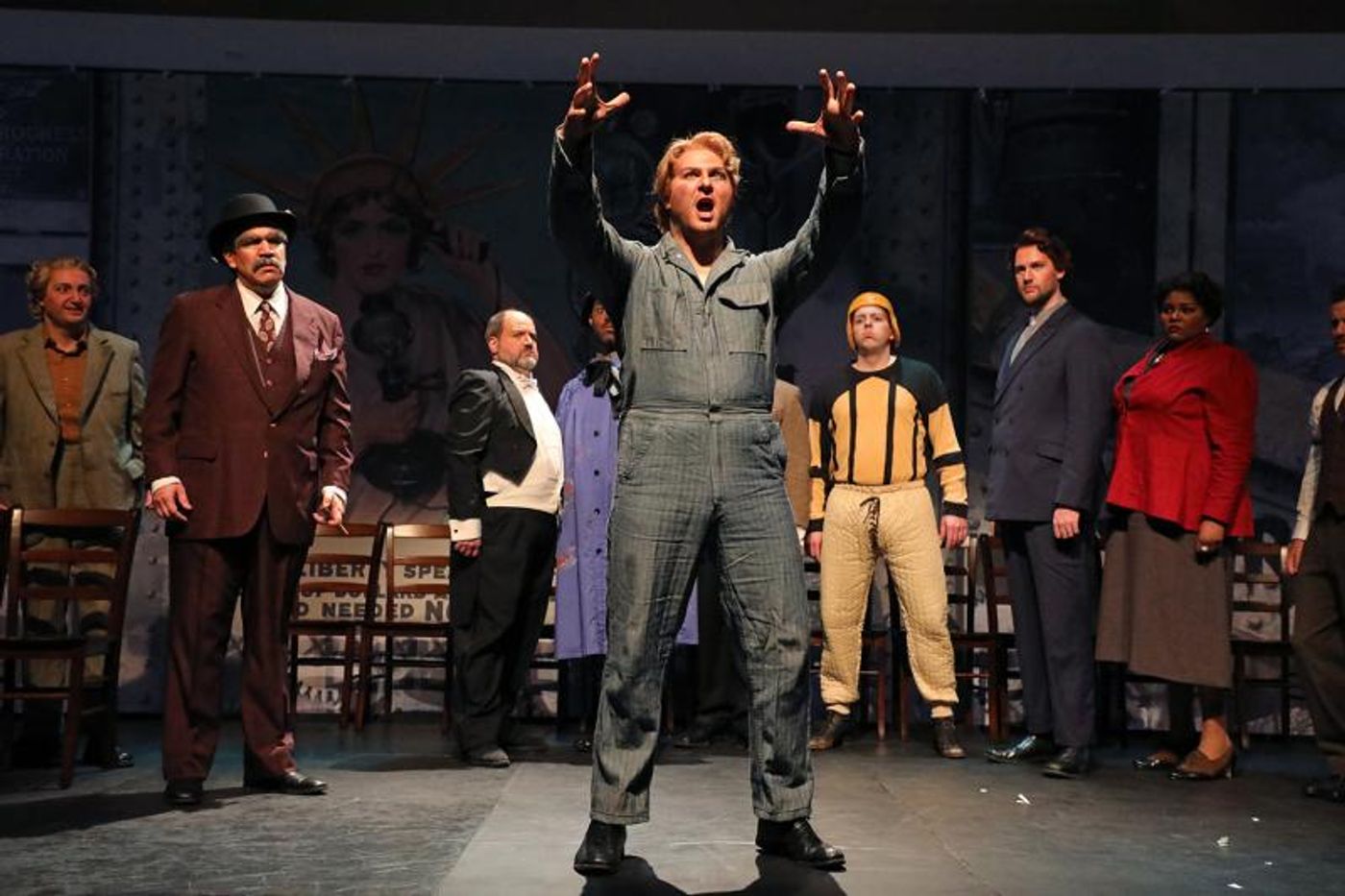
he Cradle Will Rock.
- Nashville Opera, photos by Anthony Popolo
Whether it is viewed as trenchant satire or ersatz, left-wing propaganda - a throwback to an earlier time in which artists and various other creative types sought to illuminate the plight of American workers and the poor with heavy-handed, ham-fisted exposition set to music - Marc Blitzstein's The Cradle Will Rock continues to confound those of us charged with writing about it from an artistic standpoint, providing a challenge to explain what it's about, how it fits into the current tenor of our times and, perhaps more importantly, its continued relevance.
Now onstage through Mother's Day (Sunday, May 12) in a much anticipated and gleefully subversive production from Nashville Opera, The Cradle Will Rock remains hard to define: It could be described as a work of art whose meaning, its very raison d'etre, can be bent to suit any conceivable justification. Variously, Blitzstein described his 1937 work as a "play in music" or an "opera for actors" and its history clearly paints it as either or even as both.
In Nashville Opera's sparkling, if bare-boned, production helmed by company CEO and artistic director John Hoomes, the predominantly Nashville cast - a deft blend of local theater and musical theater performers and opera singers - bring the tale to life with a shared sense of bonhomie, as if they are channeling the personages of the show's original cast to inform their onstage choices or to replicate that initial staging's sense of moral rectitude, leavened by revolutionary zeal. Clearly, Blitzstein's characters (an amalgam of early 20th century media figures, socio-political rabble rousers and "influencers" - a term first recorded in the 17th century, yet considered the exclusive purview of pundits circa two years ago) are literary (read theatrical) archetypes, given full voice by the composer to express his views and those of the like-minded, set to music evocative of the time in which it was first written that somehow remains vibrantly immediate and of this particular moment.
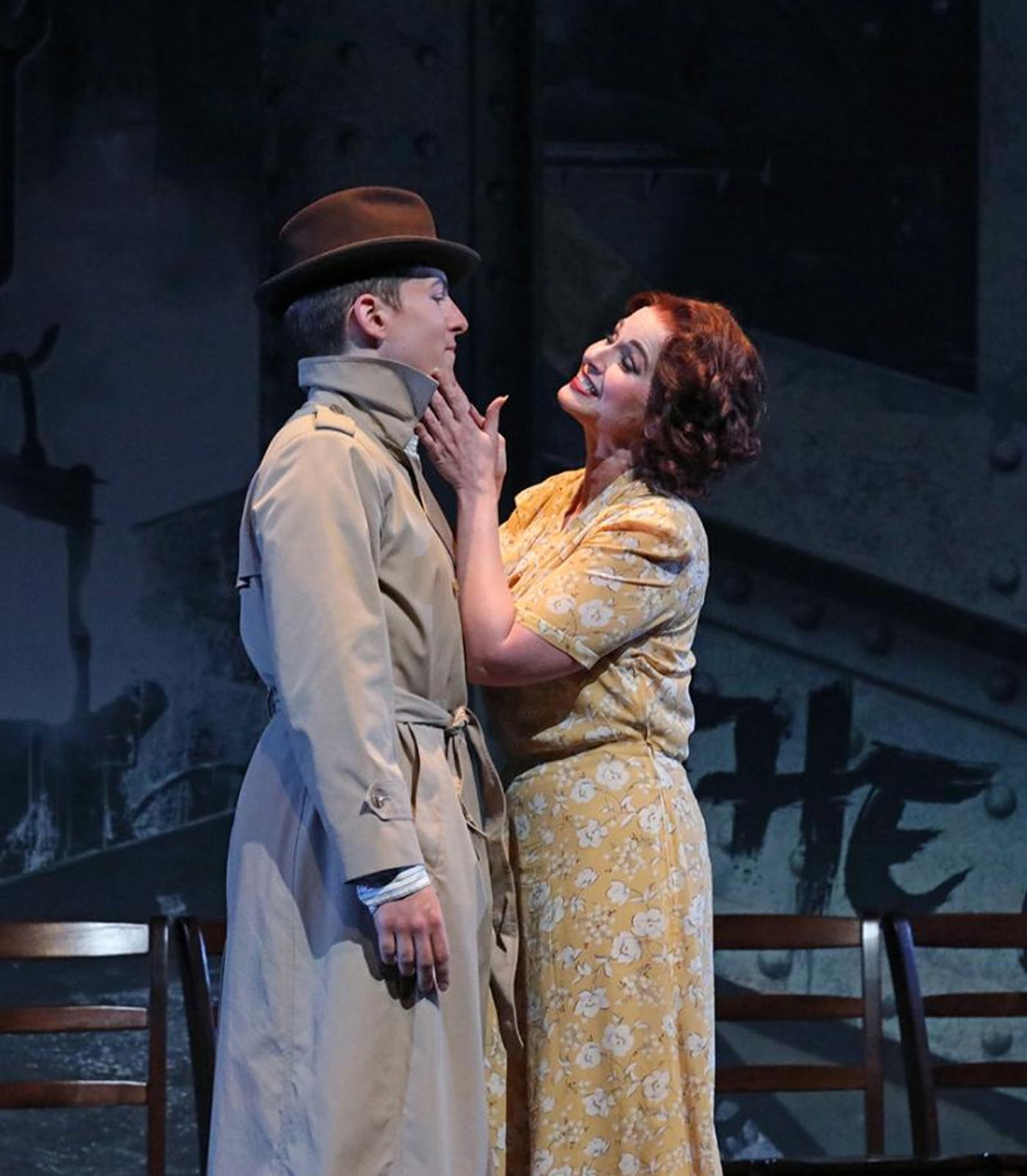
Megan Murphy Chambers as The Moll.
Whether you consider The Cradle Will Rock a "jazz opera," as the show's playbill and press releases have proclaimed it, or even as a form of experimental musical theater, you can give yourself a pat on the back for your discernment: it's both! Performed by a capable ensemble of Nashville theater personalities, augmented and supported by the glorious voices of several Nashville Opera rising stars, Blitzstein's celebrated work - an allegorical tale not unlike Bertolt Brecht's The Threepenny Opera - is enormously entertaining and informative.
Set amidst the proliferation of post-Great War politics and globalism, shown in relief against the backdrop of America during the Great Depression of 1929 and beyond, The Cradle Will Rock is a satire on the greed of the industrial/military/business complex (the leaders of which had little concern for the poor workers upon whom their financial excess and success were dependent) and the acquiescence of the general population hoping to somehow better themselves in the days before "trickle down economics" became a thing.
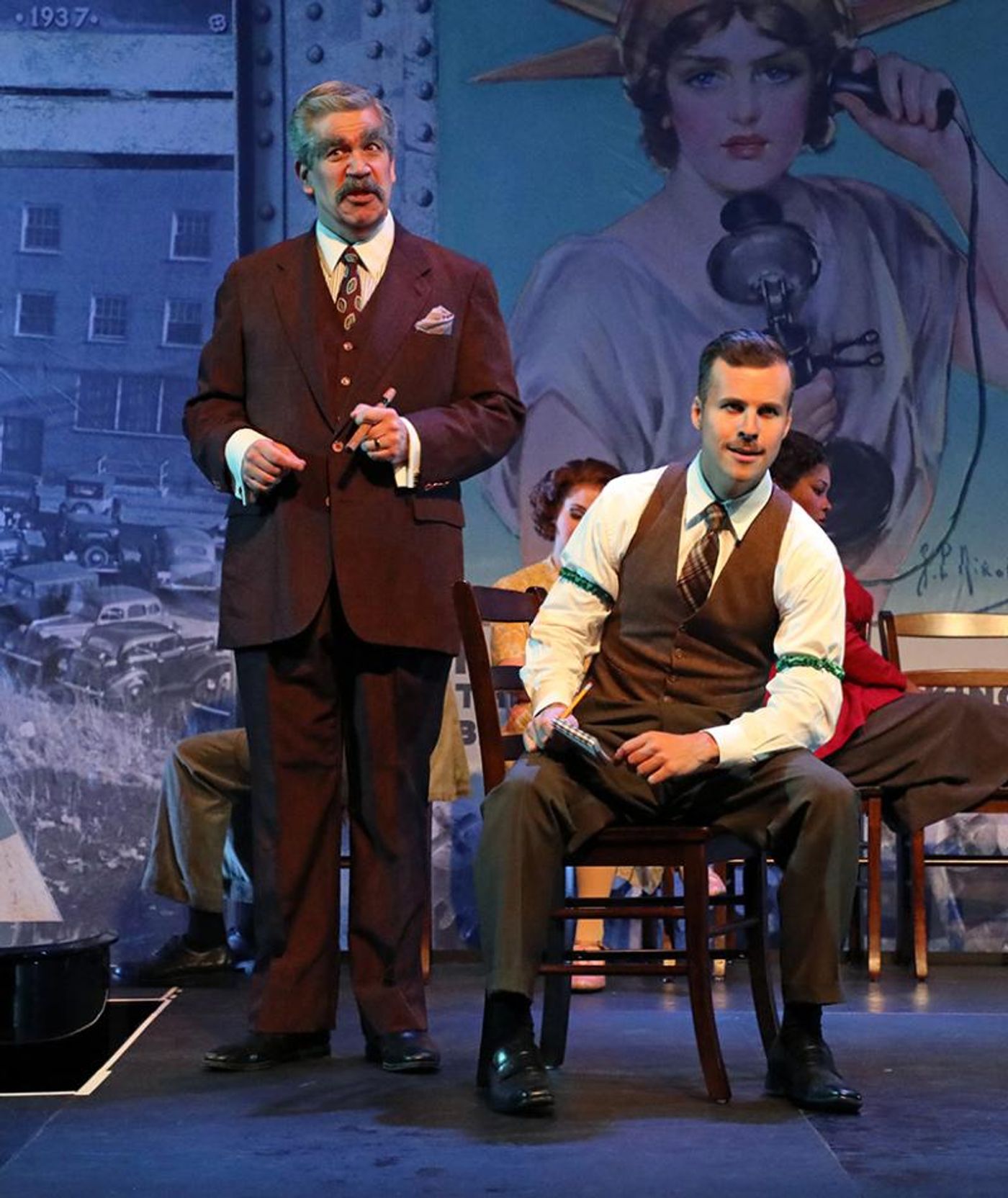
as Editor Daily
While the characters created by Blitzstein to bring his tale to life with such vivid (if rather flat, two-dimensional and predictable, truth be told, from the perspective of a theater-goer in 2019) alacrity in The Cradle Will Rock might pale in comparison to the actual people they represent, they nonetheless provide audiences with a conduit to absorb and to ascertain the composer's intent. First written as part of the Federal Theatre Project (which, in turn, was part of Franklin Roosevelt's New Deal proliferation of governmental agencies to provide an economic spark during the dark days of the Depression), it was originally directed by John Houseman and the 22-year-old Orson Welles, and its opening night was effectively shuttered by frenzied government officials fearful of the work's satire that was most assuredly fashioned to indict the ruling classes for their lack of empathy.
As a result, The Cradle Will Rock became a part of history - both theatrical and otherwise - when the entire cast, crew and audience marched uptown from its original home theatre (which had been padlocked to keep them out) to a quickly acquired performance space in which the actors had to refrain from stepping onto the stage because the intricacies of its use had not been ironed out before "the show must go on." With Blitzstein playing his score (which was originally orchestrated for some 23 musicians) on an upright piano, the actors were scattered among the assembled audience, forced to stand and sing (for their supper?) and to create a seminal moment in the chronicle of American artistic endeavor.
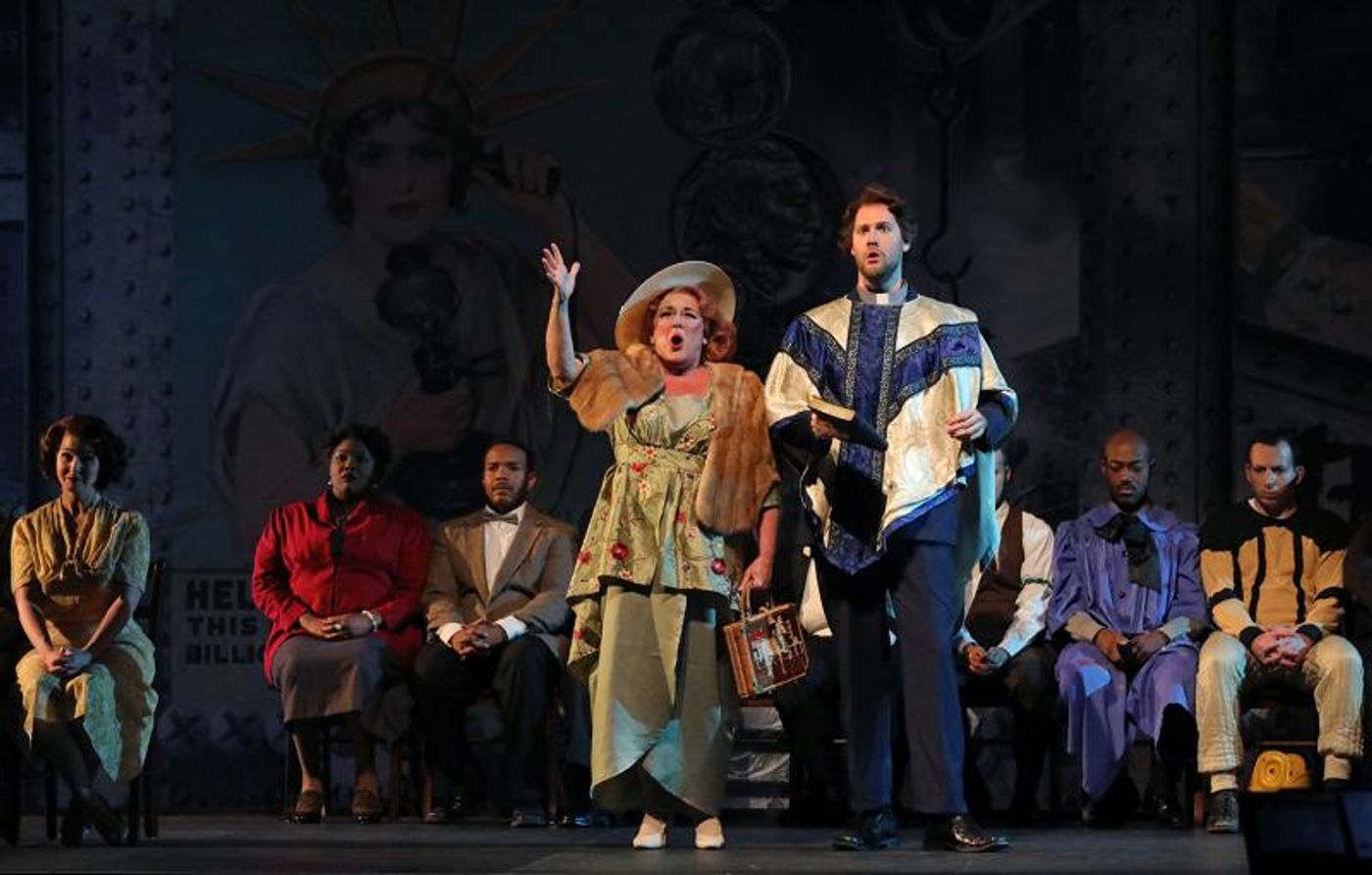
as Reverend Salvation
Set in fictional Steeltown, USA, The Cradle Will Rock relentlessly mocks the bad guys (Mr. Mister and his family, played with witty grace and bombastic artifice by Galen Fott as the patriarch, Martha Wilkinson as his wife, and Chris Simonsen and Jenny Norris as their feckless, callow children who are emblematic of the empty-headed socialites of the time) and gives the down-trodden, yet definitely noble and hard-working, heroes and heroines of the piece their due. Blitzstein's score is expressive and inspiring (one need look no further than the works of Leonard Bernstein that followed The Cradle Will Rock to see the full promise of that inspiration), while the libretto (which is almost completely sung-through, as most operas indeed are) is so rife with period-perfect jargon, colloquialisms and slang that a glossary - Do Your Speak Cradle? - is included in the production's playbill.
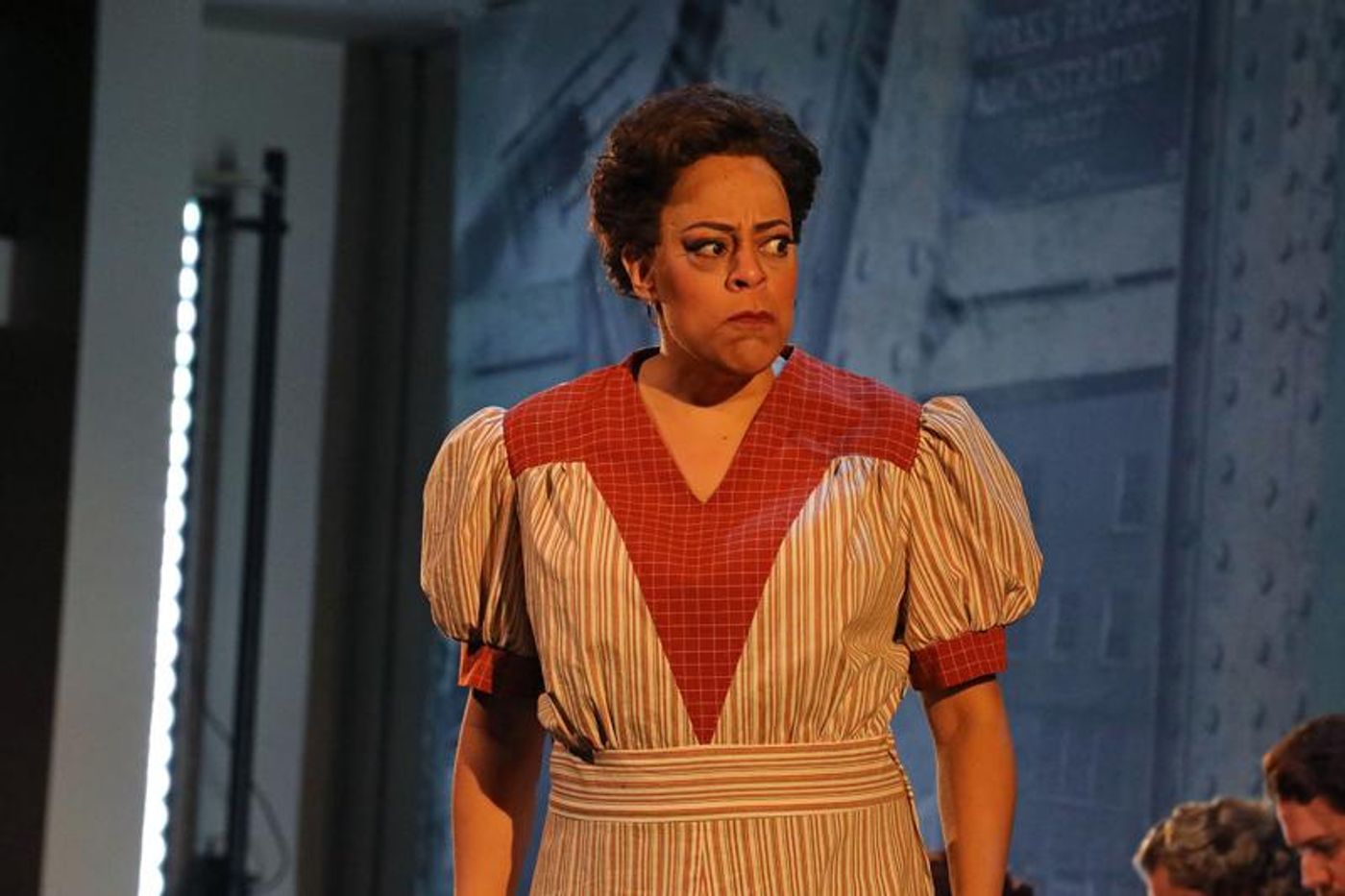
And therein lies the true genius of Blitzstein's The Cradle Will Rock: Its timeless - and altogether timely - themes, set to music that is evocative of a particular era but which sounds astoundingly contemporary when performed by Hoomes' stellar cast, accompanied by pianist Amy Tate Williams (the production's musical director interprets the score with a vital urgency that ensures the audience's laudatory response), could well have been written sometime after the 2016 elections. The rich are getting richer, the poor are getting poorer and the pervasive sense of ennui and political uncertainty should provide a breeding ground for revolutionary thought and action.
The production lacks the traditional trappings of grand opera. Hoomes' cast perform Blitzstein's work on a raised platform in front of a mural of Depression era-inspired art designed by Cara Schneider, beautifully lit in the golden glow of nostalgia that is provided by Barry Steele's lighting design. June Kingsbury, in her Nashville Opera debut, clads her ensemble in perfect period styles that help to define the era, while Sondra Nottingham's wigs and makeup design allow them to perfectly capture the visual nuances for a 1930s-set performance.
The Cradle Will Rock comes to life thanks to the skillful performances of a cadre of local stage performers, many of whom are making their Nashville Opera debuts, who prove the depth of talent and experience in local musical theater is as impressive as anywhere in the country, if not more so (in Music City, who could expect anything less?).
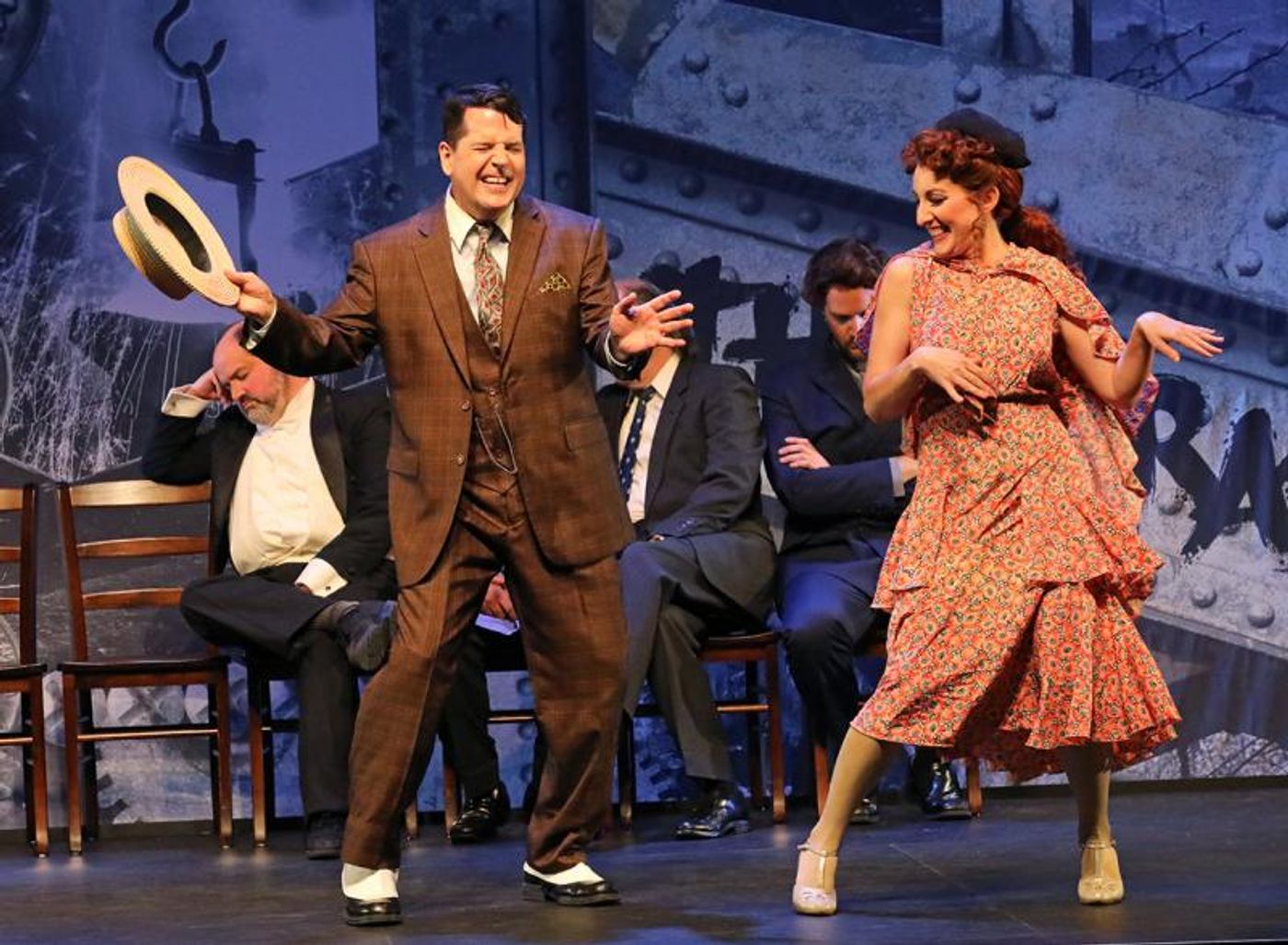
Jenny Norris as Sister Mister.
Across the board, the talented performers approach the material with a clear-eyed mission to engage their audience and they do so with a sense of bravado that is borne out of their tremendous focus and commitment made all the more palpable by their shared gift of stage presence. The starry list of musical theater performers, who have gained notoriety far and wide for their onstage exploits, sounds almost too good to be believed: Megan Murphy Chambers, Galen Fott, Martha Wilkinson, Eric Pasto-Crosby, Shawn Knight, Jenny Norris, Patrick Thomas, Scott Rice, Brooke Leigh Davis - the entire company, in fact, which also includes Brian Russell, Eddie Charlton, Jennifer Whitcomb-Oliva, Jairus Maples, Chris Simonsen and Brian Best, along with emerging opera stars Brent Hetherington, Darius Thomas, Jessie Neilson and Mark Filosa . . . truly, it's an awe-inspiring coterie of artists. To have any combination of three or more of these individuals in one cast seems an over-abundance of talent. Put them all together and the result is musical theater nirvana.
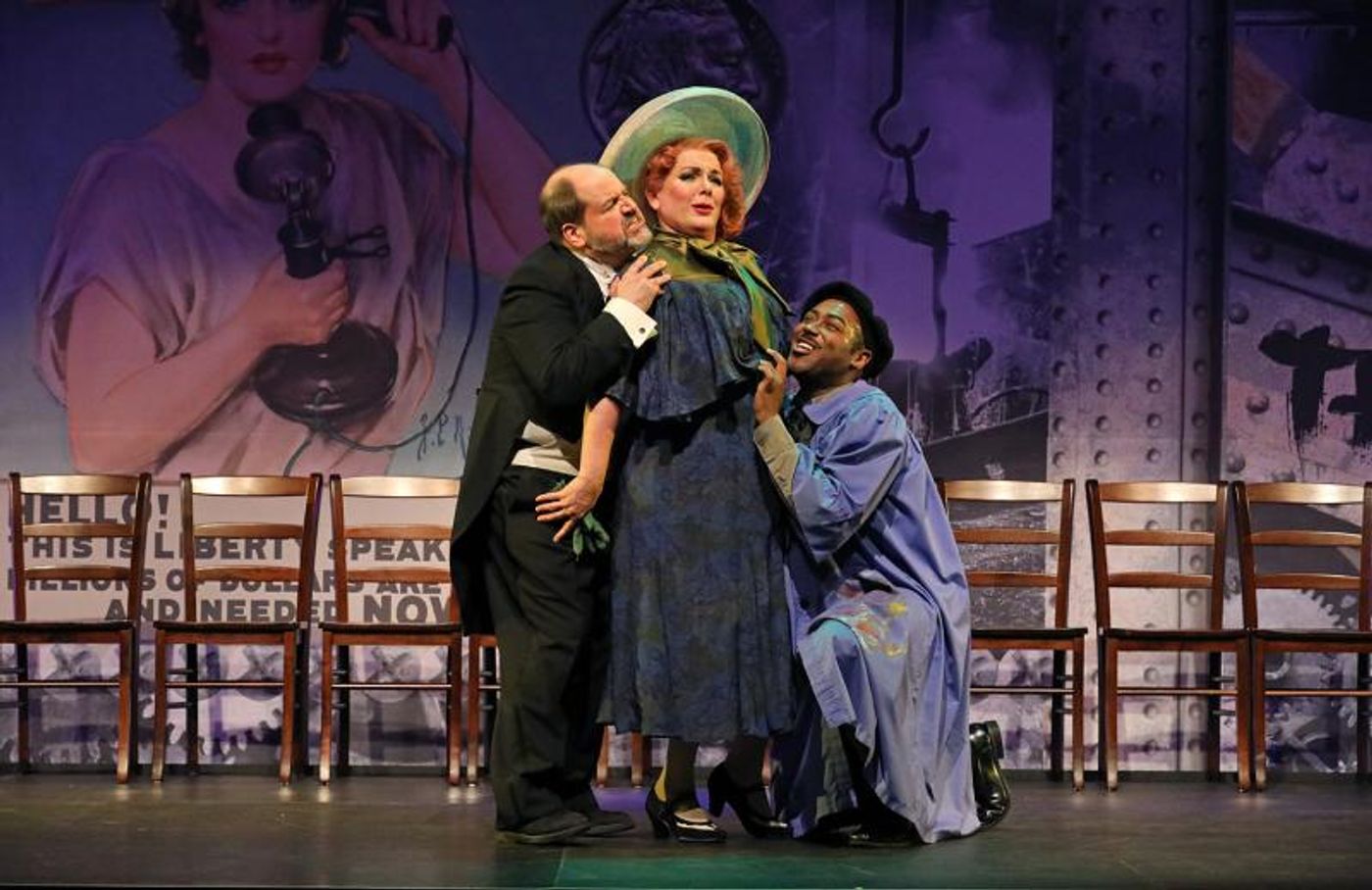
as Mrs. Mister and Darius Thomas as Dauber the Artist.
Chambers plays The Moll with a world-weary sense of who she is from her very first footfall onstage, but it is her second act performance of the bluesy "Nickel Under My Foot" that seems to effectively capture the heart and soul of her character, if not every person bearing witness to her portrayal. The title song, "The Cradle Will Rock" is performed by Eric Pasto-Crosby (cast as union organizer Larry Foreman - Blitzstein's choices for his character's monikers is both spot-on and didactic) with rousing intensity and leads to a breathtaking, even heart-stopping, conclusion. Brooke Leigh Davis, as the wife of a machinist injured at Mr. Mister's plant, essentially stops the show with her soul-stirring performance of "Joe Worker" late in Act Two that serves as an ideal showcase for her superb talents.
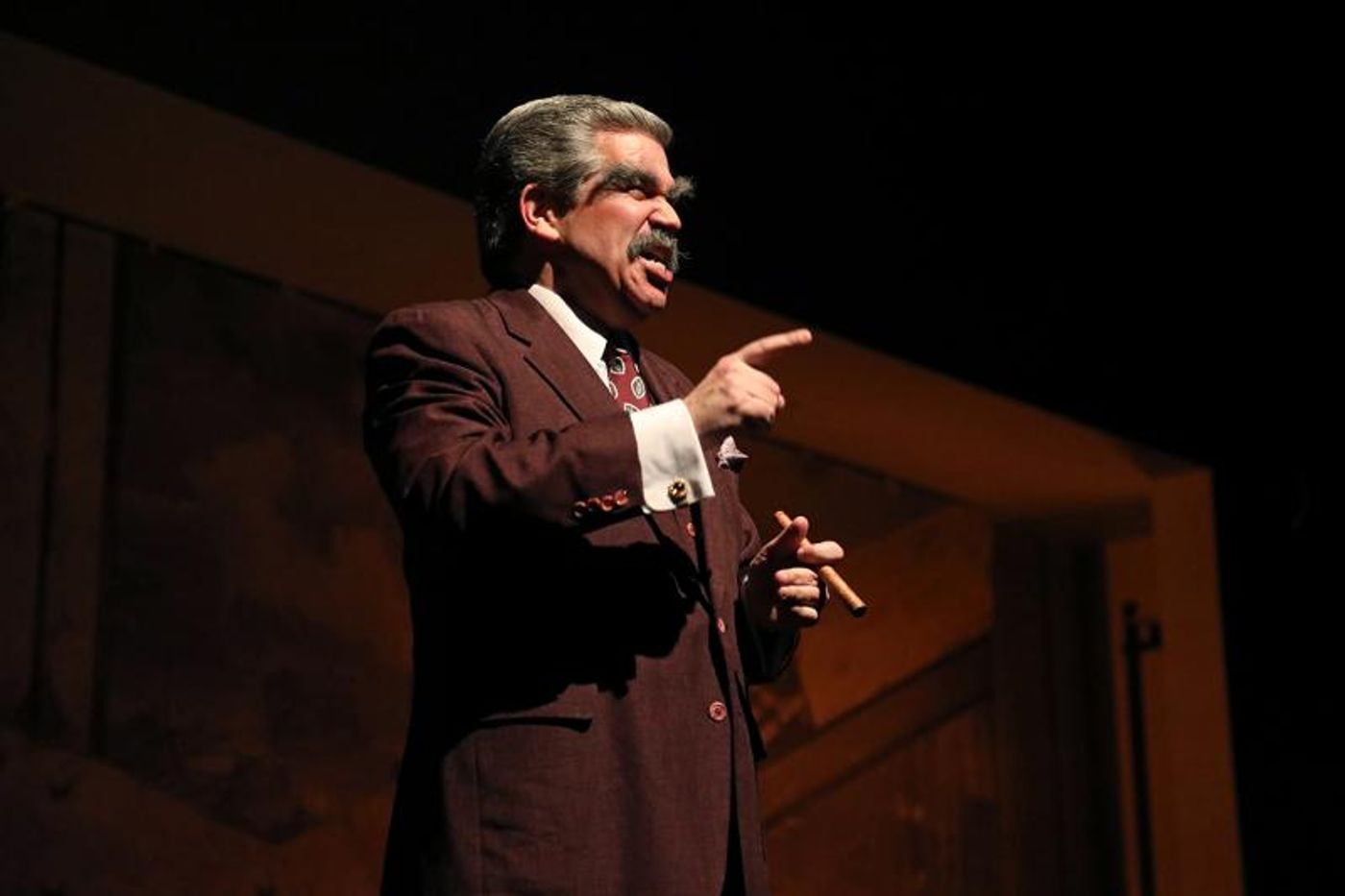
To its credit - and to the credit of Hoomes, Williams and their estimable ensemble - The Cradle Will Rock is filled with similar moments that involve every character, vignettes filled with sometimes staggering emotion (an explosive scene in which a young immigrant couple and the son (Harnish, Neilson and Maples) of an ignoble druggist are killed by anti-unionists) counter-balanced by engagingly light and amusing scenes (specifically, any scenes involving Junior Mister and Sister Mister, played with unswerving comic sensibility by Simonsen and Norris, and a trio that effectively skewers the artistic pretensions of creative types played by Rice and Thomas, along with their benefactress played to the delightfully droll hilt by Wilkinson, who shows her talents simply have no bounds).
Further, Fott is all smarmy unctuousness as the personification of "the man," aka Mr. Mister and Thomas (whose voice has never sounded better) is charmingly off-putting as the oily Editor Daily. Knight delivers another reliably authentic performance, lending heartrending feeling to his turn as Harry Druggist, whose silence and inaction leads to tragedy. Among the members of Mr. Mister's Liberty Committee (who may as well be wearing red MAGA truckers' caps), Whitcomb-Oliva, Charlton, Russell and Harnish provide prominent and notable support.
Although rarely performed in its entirety since its debut in 1937, The Cradle Will Rock is experiencing something of renaissance currently (an off-Broadway production, directed by John Doyle, runs in Manhattan through May 19), thanks to the socio-politico climate in which we now struggle to come to terms with life as we know it. Tickets - and the opportunity to witness history in the making - for Nashville Opera's The Cradle Will Rock are quickly evaporating. But you owe it to yourself to give it the old college try to score seats at the Noah Liff Opera Center (now in its 10th year of operation) for the adventure.
The Cradle Will Rock. A jazz opera with music, lyrics and book by Marc Blitzstein. Directed by John Hoomes. Musical direction by Amy Tate Williams. Presented by Nashville Opera at Noah Liff Opera Center, 3622 Redmon Street, Nashville. Through Sunday, May 12. For more information, go to www.nashvilleopera.org. Running time: 2 hours (with one 20-minute intermission).
Nashville Opera photos by Anthony Popolo
Reader Reviews
Videos

